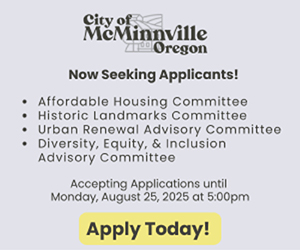Whatchamacolumn: Meeting comments on the record in Carlton, statewide
I did a double-take on our story about Monday’s Planning Commission meeting in Carlton. Concerned citizens attended to raise concerns about possible development of a gas station near a floodplain on the edge of the city, producing this news story excerpt:
“Since the gas station proposal wasn’t on the agenda, contracted city planner Scott White told the crowd, their comments would not become part of the records of the meeting. He assured them no land use application has been filed for such a project, although city staff did have a preapplication meeting with the developer in December 2023. ‘It’s rather premature to address at this time,’ he said.”
Well, our news story made those citizen concerns a part of the meeting record. But more formally, all comments are on video coverage of the meeting, which already has been posted on the city of Carlton website.
Carlton, like many Oregon governmental bodies, provides easy access to databases of agendas, information packets, audio/video recordings and minutes of its public meetings. Some do a more complete, more updated job than others in meeting that public transparency obligation.
Whatever happens in Carlton, citizens statewide soon will see increased focus on education about and enforcement of Oregon’s Public Meetings Law.
Legislation in 2023 placed oversight of that 50-year-old law with the Oregon Government Ethics Commission. This summer, assisted by an advisory committee representing government, media and the public, OGEC staff compiled new Oregon Administrative Rules for the law for public hearing and action by the nine-member OGEC Commission.
(Personal Flashback: Decades ago, the-late Paul Hanneman, 26-year state representative from Cloverdale, offered me the opportunity to chair the OGEC. That would conflict with commitments to newspaper watchdog journalism, I thought, but it would have been a stimulating experience.)
Oregon’s Public Meetings Law has lacked rigorous enforcement, but that may change as OGEC surveillance evolves. Citizens, media and government itself will become better educated and more vigilant toward the stringent legal requirements.
Here’s my own brief summary of the law:
Every “governing body” of every “public body” must pre-announce agendas for meetings of a quorum held to take or deliberate toward any decision; must let media representatives attend executive sessions to discuss subjects allowed by statute; and must provide public access to written or audio/video records of meetings.
It gets more complicated: (1) “public body” includes “the state, any regional council, county, city or district, or any municipal or public corporation, or any board, department, commission, council, bureau, committee or subcommittee or advisory group or any other agency thereof”; (2) “governing body” includes “the members of any public body which consists of two or more members, with the authority to make decisions for or recommendations to a public body on policy or administration.”
So, a two-person advisory work group of a subcommittee of a committee of a commission answering to a city council are a governing body subject to all elements of the Public Meetings law.
More on this topic to come, as the News-Register continues early launch of its “Public Access Team” project to focus more attention on transparency in government.
Jeb Bladine can be reached at jbladine@newsregister.com or 503-687-1223.








Comments